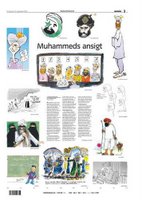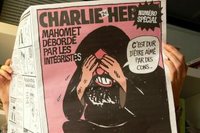
I had an email from Slightly this morning. He was asking me if I had a picture of the book for which those infamous cartoons had been originally intended. He has been asked to do a lecture in some forsaken art college about design and diversity and wants to use this picture as a case study. Let's hope he doesn't have any militant Muslim in the audience...
I did not have a copy of the picture but being the Internet wizz that I am (read I have nothing else to do and am a sad git), I quickly managed to locate the said picture (included in the book's author's profile on Wikipedia - link below). I also discovered that the book in question, Koranen og profeten Muhammeds liv (The Qur'an and the life of the Prophet Muhammad) by Kåre Bluitgen is actually a children's book. This is, I have to say rather surprising news. I mentioned in the post below that I don't think the majority of the cartoons are particularly good, some of them don't actually make much sense either. Now that I know they were intended for a children's book, I also think that most of them are inappropriate. Not because I think they would be offensive but simply because I don't think children would understand the more satirical ones.
 In France the controversial and often tasteless newspaper Charlie Hebdo decided this morning to publish the cartoons again, accompanying them with one of their own by cartoonist Cabu (one of their foremost contributors). The caption says: "Mohammed overwhelmed by fundamentalists". Mohammed says: "It's tough to be loved by idiots" (the literal translation should be "cunts" but it is much stronger in English than "con" is in French). In an interview this morning on the Today Programme, one of the cartoonists for the paper (who wanted to remain anonymous) said that they were publishing the cartoons to defence freedom of expression. I am not convinced this is the best way to do that considering what has happened so far.
In France the controversial and often tasteless newspaper Charlie Hebdo decided this morning to publish the cartoons again, accompanying them with one of their own by cartoonist Cabu (one of their foremost contributors). The caption says: "Mohammed overwhelmed by fundamentalists". Mohammed says: "It's tough to be loved by idiots" (the literal translation should be "cunts" but it is much stronger in English than "con" is in French). In an interview this morning on the Today Programme, one of the cartoonists for the paper (who wanted to remain anonymous) said that they were publishing the cartoons to defence freedom of expression. I am not convinced this is the best way to do that considering what has happened so far.
Charlie Hebdo, which mostly publishes satirical cartoons, is renowned in France for being controversial and often rather gratuitously provocative.
The excellent Wikipedia has the full sorry story.
I did not have a copy of the picture but being the Internet wizz that I am (read I have nothing else to do and am a sad git), I quickly managed to locate the said picture (included in the book's author's profile on Wikipedia - link below). I also discovered that the book in question, Koranen og profeten Muhammeds liv (The Qur'an and the life of the Prophet Muhammad) by Kåre Bluitgen is actually a children's book. This is, I have to say rather surprising news. I mentioned in the post below that I don't think the majority of the cartoons are particularly good, some of them don't actually make much sense either. Now that I know they were intended for a children's book, I also think that most of them are inappropriate. Not because I think they would be offensive but simply because I don't think children would understand the more satirical ones.
 In France the controversial and often tasteless newspaper Charlie Hebdo decided this morning to publish the cartoons again, accompanying them with one of their own by cartoonist Cabu (one of their foremost contributors). The caption says: "Mohammed overwhelmed by fundamentalists". Mohammed says: "It's tough to be loved by idiots" (the literal translation should be "cunts" but it is much stronger in English than "con" is in French). In an interview this morning on the Today Programme, one of the cartoonists for the paper (who wanted to remain anonymous) said that they were publishing the cartoons to defence freedom of expression. I am not convinced this is the best way to do that considering what has happened so far.
In France the controversial and often tasteless newspaper Charlie Hebdo decided this morning to publish the cartoons again, accompanying them with one of their own by cartoonist Cabu (one of their foremost contributors). The caption says: "Mohammed overwhelmed by fundamentalists". Mohammed says: "It's tough to be loved by idiots" (the literal translation should be "cunts" but it is much stronger in English than "con" is in French). In an interview this morning on the Today Programme, one of the cartoonists for the paper (who wanted to remain anonymous) said that they were publishing the cartoons to defence freedom of expression. I am not convinced this is the best way to do that considering what has happened so far. Charlie Hebdo, which mostly publishes satirical cartoons, is renowned in France for being controversial and often rather gratuitously provocative.
The excellent Wikipedia has the full sorry story.
Tags: Jyllands-Posten, Mohammed cartoon, cartoons, cartoon, Islam, Muslim Cartoon, faith harlie Hebdo, Kåre Bluitgen.
The cartoons weren't intended for the children's book. The newspaper decided to commission them on learning that the illustrators working on pictores of Mohammed would only do so anonymously.
ReplyDeleteThe cartoons weren't intended for the children's book. The newspaper decided to commission them on learning that the illustrators working on pictores of Mohammed would only do so anonymously.
ReplyDelete